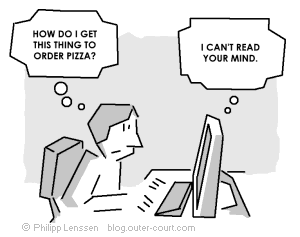Sunday, March 14, 2004
Google’s Brin on Image Recognition

“I don’t think that in the near future we’re going to have a service that takes a picture, and the computer decides, oh, that’s an elephant, so we search for an elephant. That seems funny to us. We should be able to do it.”
– Sergey Brin at World Economic Forum in Davos, What Is Added Value in Search Capabilities? (AlwaysOn), posted 10/03/2004
Different Types of Searchers

The Goobie (Google Newbie)
Typical query: Where can I find pizza in my hometown?
First page: “Where in the world can you stop and smell the roses, soothe a savage beast, and make diamonds your best friend?”
The Gookie (Google Rookie)
Typical query: Pizza Chicago
First page: “Please pardon our dust as we construct our new WWW site. The images and what-not should be back sooner or later”
The Goopert (Google Expert)
Tyical query: “order pizza” location:chicago -free
First page: “Don’t hold back! We need your money! A piping hot pizza will be delivered to your terminal before you can count to 300 billion!”
Google Gets More Fuzzy
Previously I mentioned how Google now merges words, and I found another example. Enter non-existent or nonexistent into Google and you get almost the same results; both “nonexistent”, “non-existent”, and variants like “non” or “non existent” are highlighted in the result list. (Misspellings like “existant” in “non existant” are not understood.)
Sidenote: I’ve been asked via email how I can know Google really understands the different word and doesn’t just act upon backlinks like it did before. Because when you point to a page using “hello” as word, the page will be associated with the word “hello” even if it doesn’t appear in the page itself a single time – Googlebombing (the effectiveness of which has been decreased since Florida update) takes this idea to the extreme.
So how can you spot the difference? First, the words will be bold in the result list. Second, the cache will also bold the terms (as opposed to read something like “These words only appear in links pointing to this page”). And third, Google would then also return the page if you enclose the query into quote marks.
In other words Google now understands how to break up words into their separate parts, and merge separate parts into one again. However this is restricted to meaningful words as found in a large dictionary. E.g. entering a bogus “non-google” returns very different results than “nongoogle”.
But what if you want to force your version of the word spelling upon the results? Well, you still can, by putting quotes around it. So a quoted “non-existent” won’t get you to any pages containing only “nonexistent” (unless link text with your phrase points to it).
As of late Google can be said to act more and more fuzzy, which is a good thing. Behind the scenes the Google Inc. engineers continue to optimize query basics. This should have much stronger impact on regulars searchers than adding any new “secret” feature to please the geek crowd.
Selling Google
“The FBI has arrested a Dutch native in New York for allegedly selling $2.8 million in nonexistent shares of Google, the Internet search engine.”
– Verne Kopytoff, Man held in Google stock fraud (San Francisco Chronicle on Shamoon Rafiq selling shares of “Series B Preferred Stock”), March 13, 2004
>> More posts
Advertisement
This site unofficially covers Google™ and more with some rights reserved. Join our forum!
